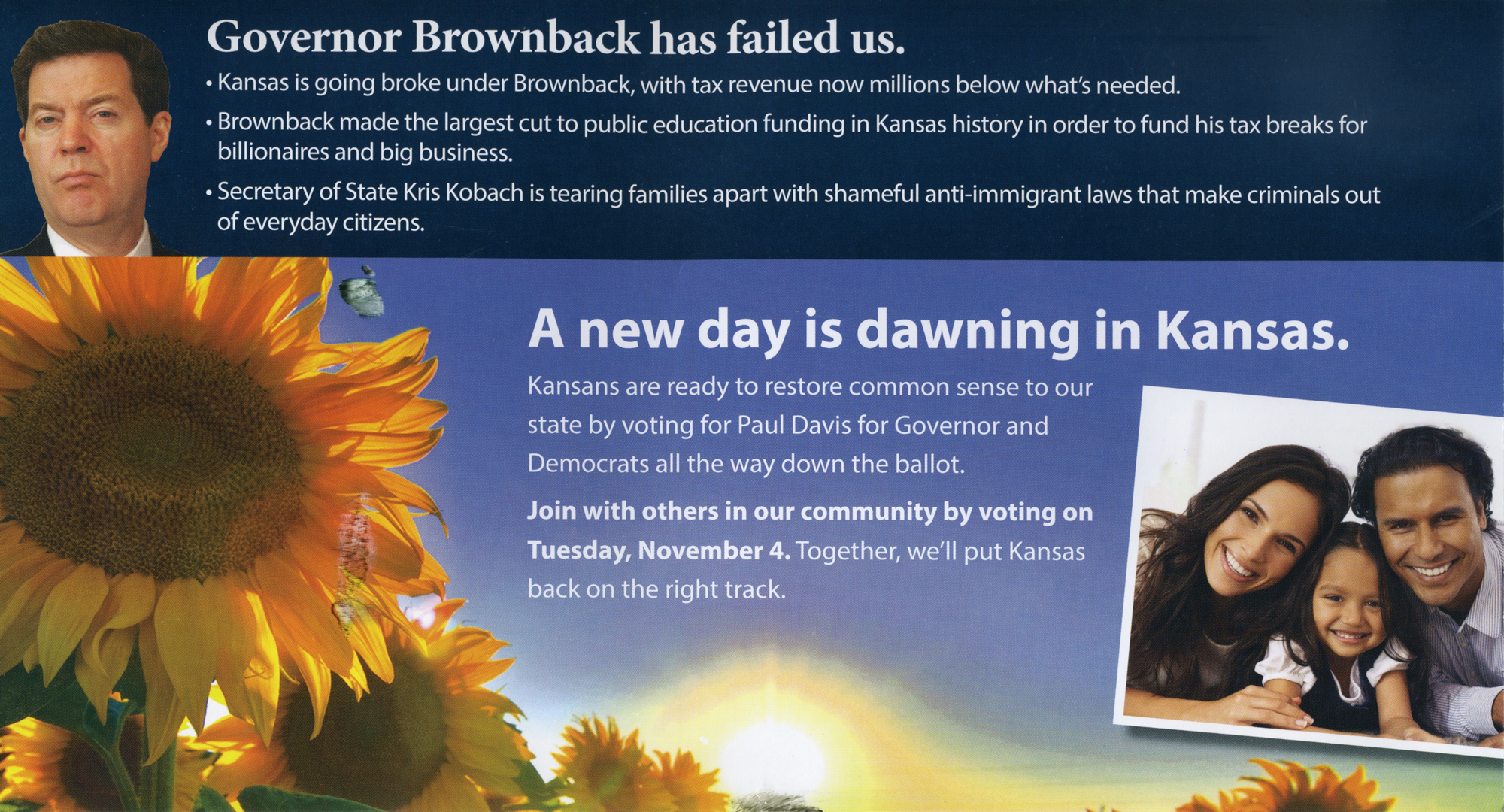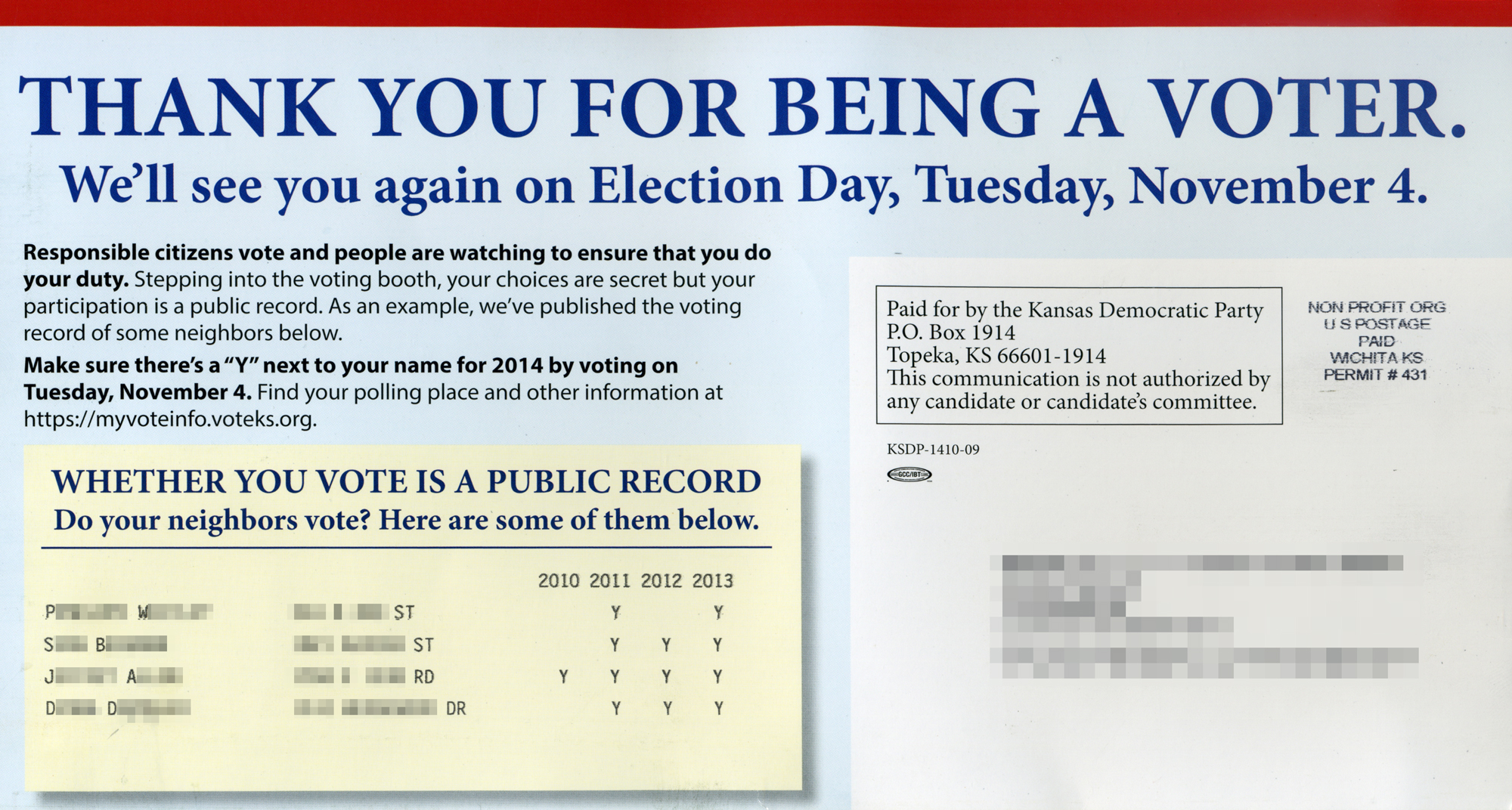
Democratic Party mailer upsets some Kansas voters

The front of a mailer sent out by the Kansas Democratic Party that was intended to boost voter turnout but has instead caused some voters to complain about an invasion of privacy.
A postcard sent out recently by the Kansas Democratic Party that was intended to boost voter turnout has instead caused some voters to complain about an invasion of privacy.
“Responsible citizens vote and people are watching to ensure that you do your duty,” the postcard reads.
It goes on to explain that while a person’s choices on the ballot are secret, the fact that a person did or didn’t vote is a matter of public record. And to drive that point home, it lists the names of some of the recipients’ neighbors, along with the indicators about whether or not they had voted in each of the last few years.
“Outraged,” said Chris Lazzarino of Lawrence when asked how he felt when he received the postcard. “It felt Orwellian to me. The mailer literally said people are watching you, and it intimated that if you didn’t vote you would be potentially shamed in a similar mailer that could go out in future years.”

The front of a mailer sent out by the Kansas Democratic Party that was intended to boost voter turnout but has instead caused some voters to complain about an invasion of privacy.

The back of a mailer sent out by the Kansas Democratic Party that has caused some voters to complain about an invasion of privacy. Names, addresses and voting records of recipients' neighbors (blurred out) are listed on the postcard.
But not everyone was upset by the mailer. James Sallee of Lawrence is one of the people whose name, address and voting record are listed on the postcard that Lazzarino received. He said he was not aware that his name and voting record were being used but that he wasn’t concerned.
“No, I don’t mind that,” Sallee said.
Another person who received the postcard emailed the Journal-World to say she objected to the idea that the party might distribute her name, address and voting information to her neighbors.
“Personally, I do not want my information distributed to anyone, even my address,” said Amy Wycoff of Lawrence. “And out of respect for my neighbors, I do not want their information either. … Politically, this plays into the belief held by some that democrats have a socialist (communist) agenda and this could backfire for the KDP. ”
Kansas Democratic Party Chairwoman Joan Wagnon said she has received phone calls from voters expressing similar concerns. But she said there is research to show that such a campaign actually boosts voter turnout.
“I know it bothers some people, and for that I’m really sorry,” Wagnon said. “We’re just trying to make sure people go and vote. It’s a strategy that’s been tried in a number of places and it works.”
The postcards are part of data-driven campaign known as “micro-targeting” that Kansas Democrats have used this year. In this case, Wagnon said, the postcards, which are tailored to each individual recipient, are mailed to voters who’ve been identified as low- or medium-propensity voters — people who tend to turn out for presidential elections, but less frequently in midterm elections like the one this year.
But Mark Sump, a former fellow at the Dole Institute of Politics who is now managing Democrat Margie Wakefield’s congressional campaign, said that while there is research to show it increases turnout, there is also research to show it turns voters off.
“We were completely blindsided. We had no idea they were doing something like this, and would have suggested not doing it,” Sump said. “Margie feels the same way.”
Lazzarino said he has not voted in recent presidential elections because he feels the Electoral College system makes it irrelevant how he votes because no matter what, all the state’s electoral votes go the the Republican candidate.
He said he was intending to vote in this year’s races for governor and U.S. Senate, but the postcard by the Democratic Party makes it less likely that he will vote for Democratic candidates.
“But that does not mean it will make me more likely to vote for a Republican candidate,” Lazzarino said.

